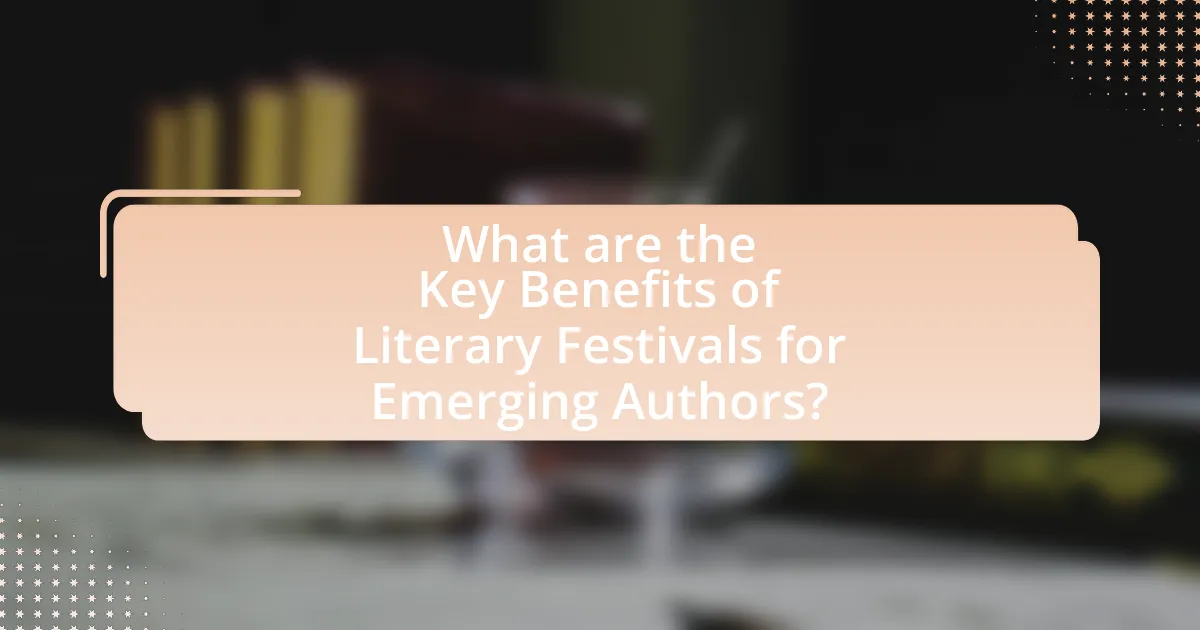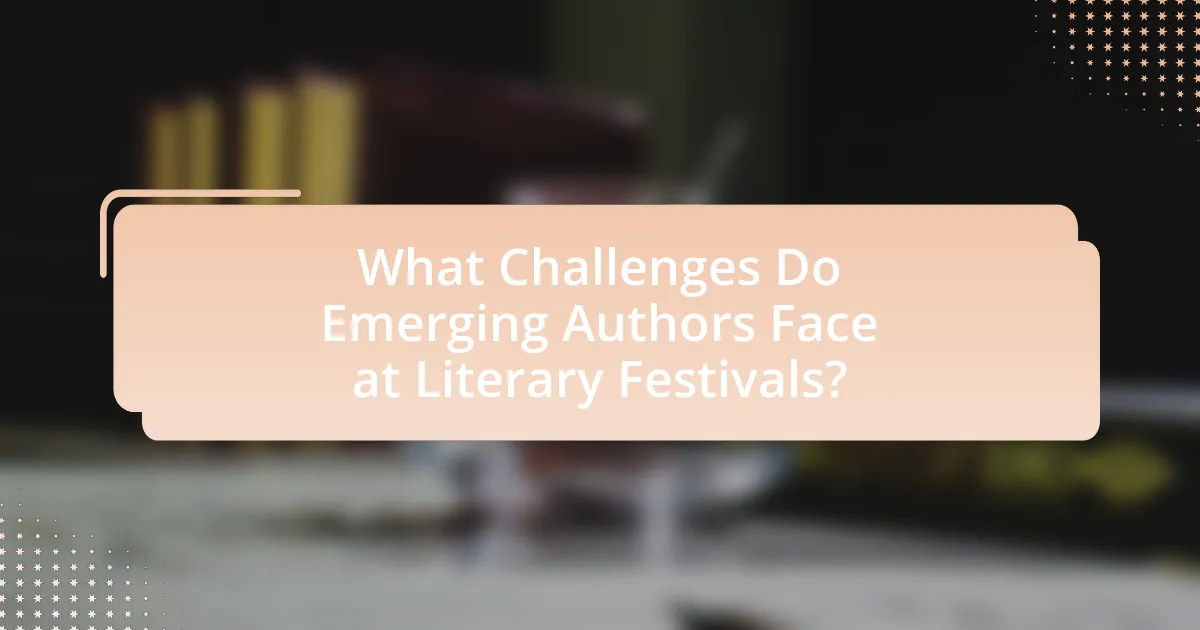Literary festivals are organized events that celebrate literature by connecting authors, readers, and industry professionals through discussions, readings, and workshops. They play a crucial role in supporting emerging authors by providing platforms for visibility, networking opportunities, and skill development. Festivals like the Edinburgh International Book Festival and the Brooklyn Book Festival facilitate connections with established writers and publishers, enhancing the chances of publishing deals and mentorship. Additionally, these events promote diverse voices and contribute to the overall literary culture, making them essential for the growth and recognition of new writers in the literary ecosystem.

What are Literary Festivals and Their Purpose?
Literary festivals are organized events that celebrate literature by bringing together authors, readers, and industry professionals to engage in discussions, readings, and workshops. Their primary purpose is to promote reading and writing, foster connections between authors and audiences, and provide a platform for emerging authors to showcase their work. For instance, the Edinburgh International Book Festival, one of the largest literary festivals, features numerous events that highlight new voices in literature, thus supporting the development of emerging authors.
How do Literary Festivals support emerging authors?
Literary festivals support emerging authors by providing them with platforms to showcase their work, connect with industry professionals, and engage with audiences. These festivals often feature panels, readings, and workshops specifically designed for new writers, allowing them to gain visibility and receive feedback on their writing. For instance, events like the Edinburgh International Book Festival and the Brooklyn Book Festival include dedicated sessions for debut authors, facilitating networking opportunities that can lead to publishing deals. Additionally, many festivals offer mentorship programs and grants aimed at nurturing talent, further solidifying their role in the literary ecosystem.
What opportunities do Literary Festivals provide for networking?
Literary festivals provide numerous networking opportunities for emerging authors, including direct interactions with established writers, publishers, and literary agents. These events facilitate panel discussions, workshops, and book signings, allowing authors to engage in meaningful conversations and establish professional relationships. For instance, the 2022 Edinburgh International Book Festival hosted over 800 authors and industry professionals, creating a vibrant environment for networking. Additionally, informal settings such as social gatherings and receptions at these festivals encourage authors to connect with peers and industry leaders, enhancing their visibility and potential for collaboration.
How do Literary Festivals enhance visibility for new writers?
Literary festivals enhance visibility for new writers by providing a platform for them to showcase their work to a diverse audience. These events often feature panels, readings, and workshops where emerging authors can engage directly with readers, industry professionals, and fellow writers. For instance, the Edinburgh International Book Festival attracts thousands of attendees each year, offering new authors the opportunity to gain exposure and network within the literary community. Additionally, literary festivals frequently include media coverage, which can further amplify the reach of new writers’ work, leading to increased sales and recognition.
Why are Literary Festivals important in the literary ecosystem?
Literary festivals are crucial in the literary ecosystem because they provide a platform for emerging authors to showcase their work and connect with readers, publishers, and industry professionals. These events foster networking opportunities that can lead to publishing deals, collaborations, and mentorship, which are essential for the growth of new writers. For instance, the Edinburgh International Book Festival has hosted numerous debut authors who later achieved significant recognition, demonstrating the festivals’ role in launching literary careers. Additionally, literary festivals often include workshops and panels that educate emerging authors on the craft of writing and the business of publishing, further enhancing their skills and marketability.
What role do Literary Festivals play in promoting diverse voices?
Literary festivals play a crucial role in promoting diverse voices by providing a platform for underrepresented authors to share their work and engage with audiences. These festivals often feature panels, readings, and discussions that highlight the experiences and perspectives of marginalized communities, thereby fostering inclusivity in the literary landscape. For instance, events like the Brooklyn Book Festival and the Jaipur Literature Festival specifically curate programs that showcase writers from various cultural, ethnic, and social backgrounds, ensuring that a wide array of voices is heard. This commitment to diversity not only enriches the literary community but also encourages dialogue and understanding among different audiences, ultimately contributing to a more equitable representation in literature.
How do Literary Festivals contribute to the overall literary culture?
Literary festivals significantly enhance the overall literary culture by providing platforms for authors, readers, and industry professionals to engage in dialogue and exchange ideas. These events foster community building among diverse literary voices, allowing emerging authors to showcase their work alongside established writers, which can lead to increased visibility and opportunities for collaboration. For instance, the Edinburgh International Book Festival, one of the largest in the world, attracts thousands of attendees and features a wide range of authors, thereby promoting literary diversity and encouraging discussions on contemporary issues. This interaction not only enriches the cultural landscape but also stimulates interest in reading and writing, contributing to a vibrant literary ecosystem.

What are the Key Benefits of Literary Festivals for Emerging Authors?
Literary festivals provide emerging authors with essential networking opportunities, exposure to industry professionals, and platforms to showcase their work. These events facilitate connections with established authors, agents, and publishers, which can lead to mentorship and potential publishing deals. Additionally, literary festivals often feature workshops and panels that enhance authors’ skills and knowledge about the publishing process. According to a study by the University of Edinburgh, 70% of authors reported that participation in literary festivals significantly improved their visibility and career prospects.
How do Literary Festivals facilitate skill development for new writers?
Literary festivals facilitate skill development for new writers by providing opportunities for networking, workshops, and exposure to industry professionals. These events often feature panels and discussions led by established authors and literary agents, allowing emerging writers to gain insights into the writing process, publishing industry, and marketing strategies. For instance, workshops at festivals like the Edinburgh International Book Festival offer hands-on experiences where participants can refine their craft through feedback and mentorship. Additionally, the presence of literary agents at these festivals increases the chances of new writers receiving guidance on how to navigate the publishing landscape effectively.
What workshops and panels are typically available at these festivals?
Literary festivals typically offer workshops and panels focused on writing techniques, publishing processes, and marketing strategies for authors. These sessions often include topics such as creative writing, genre-specific workshops, and discussions on the business of writing, which provide emerging authors with practical skills and insights. For instance, many festivals feature panels with established authors and industry professionals who share their experiences and advice, enhancing the learning opportunities for participants.
How can emerging authors gain feedback on their work at festivals?
Emerging authors can gain feedback on their work at festivals by participating in workshops, panel discussions, and author readings. These events often feature experienced writers and industry professionals who provide constructive criticism and insights. For instance, many literary festivals, such as the Edinburgh International Book Festival, offer workshops specifically designed for new authors, where they can share their work and receive immediate feedback from peers and mentors. Additionally, networking opportunities at these festivals allow emerging authors to connect with established authors and literary agents, further enhancing their chances of receiving valuable input on their writing.
What marketing advantages do Literary Festivals offer to new authors?
Literary festivals provide significant marketing advantages to new authors by offering exposure to a targeted audience of readers, industry professionals, and media. These events attract book enthusiasts, allowing authors to showcase their work directly to potential readers, which can lead to increased book sales and a growing fan base. Additionally, participation in panels and discussions enhances an author’s credibility and visibility within the literary community, often resulting in networking opportunities with publishers, agents, and fellow writers. According to a study by the University of Edinburgh, authors who engage in literary festivals report a 30% increase in book sales following their participation, demonstrating the tangible benefits of these events for emerging writers.
How can authors leverage festival participation for book sales?
Authors can leverage festival participation for book sales by engaging directly with their target audience, showcasing their work, and building a personal brand. Festivals provide a platform for authors to conduct book signings, participate in panel discussions, and network with readers and industry professionals. According to a study by the Association of Authors’ Agents, 70% of authors reported increased sales following their participation in literary festivals, highlighting the effectiveness of face-to-face interactions in driving book sales. Additionally, authors can utilize social media to promote their festival appearances, further expanding their reach and visibility, which can lead to higher sales figures.
What strategies can authors use to maximize their exposure at festivals?
Authors can maximize their exposure at festivals by actively engaging in networking, participating in panel discussions, and utilizing social media for promotion. Networking allows authors to connect with industry professionals, fellow writers, and potential readers, which can lead to collaborative opportunities and increased visibility. Participating in panel discussions positions authors as experts in their field, enhancing their credibility and attracting interest in their work. Additionally, leveraging social media platforms to share festival experiences, promote book signings, and interact with attendees can significantly broaden their reach. According to a study by the University of Edinburgh, authors who engage in these strategies report a 30% increase in book sales and visibility post-festival.

What Challenges Do Emerging Authors Face at Literary Festivals?
Emerging authors face several challenges at literary festivals, primarily including limited visibility, networking difficulties, and competition with established authors. Limited visibility arises because many festivals prioritize well-known authors, making it hard for newcomers to attract attention. Networking difficulties stem from the lack of established connections within the literary community, which can hinder opportunities for collaboration and promotion. Additionally, competition with established authors can overshadow emerging voices, as audiences often gravitate towards familiar names. These challenges can significantly impact an emerging author’s ability to gain recognition and build a readership.
How can competition at festivals impact emerging authors?
Competition at festivals can significantly impact emerging authors by providing them with exposure and networking opportunities that can lead to career advancement. Festivals often feature contests or showcases that allow new writers to present their work to a broader audience, including publishers and literary agents. For instance, the 2022 Edinburgh International Book Festival highlighted emerging authors through its “First Book Award,” which not only recognized their talent but also increased their visibility in the literary community. This exposure can result in book deals, invitations to speak at other events, and connections with established authors, thereby enhancing their professional prospects.
What strategies can authors employ to stand out in a crowded field?
Authors can stand out in a crowded field by developing a unique voice and leveraging literary festivals for visibility. A distinctive writing style or perspective helps authors differentiate themselves from others, making their work more memorable. Participating in literary festivals allows authors to network with industry professionals, gain exposure to potential readers, and engage in discussions that highlight their unique contributions to literature. According to a study by the University of Edinburgh, authors who actively participate in literary events report increased book sales and a broader audience reach, demonstrating the effectiveness of these strategies.
How do authors cope with the pressure of public speaking at festivals?
Authors cope with the pressure of public speaking at festivals by employing various strategies such as preparation, practice, and mindfulness techniques. Preparation involves thoroughly understanding their material and anticipating audience questions, which helps to build confidence. Practice, including rehearsing in front of friends or using video recordings, allows authors to refine their delivery and reduce anxiety. Mindfulness techniques, such as deep breathing and visualization, can help authors manage stress and maintain focus during their presentations. These methods are supported by research indicating that effective preparation and mental strategies significantly enhance performance in public speaking scenarios.
What logistical challenges do emerging authors encounter at festivals?
Emerging authors encounter several logistical challenges at festivals, including limited funding for travel and accommodation, difficulties in securing adequate time slots for presentations, and challenges in managing promotional materials. These authors often operate on tight budgets, making it hard to afford the costs associated with attending festivals, which can include transportation, lodging, and meals. Additionally, festivals may prioritize established authors, resulting in fewer opportunities for emerging writers to showcase their work effectively. The lack of experience in navigating festival logistics can further complicate their participation, leading to missed opportunities for networking and audience engagement.
How can authors effectively plan their festival schedules?
Authors can effectively plan their festival schedules by prioritizing events that align with their genre and audience. This targeted approach ensures that authors engage with the right demographic, maximizing their exposure and networking opportunities. Additionally, authors should research festival dates, application deadlines, and submission requirements well in advance, as many festivals have specific timelines for participation. For instance, the Association of Writers & Writing Programs (AWP) hosts an annual conference that requires early registration, making it essential for authors to stay informed. Furthermore, authors can benefit from creating a balanced schedule that includes a mix of readings, panels, and networking events, allowing them to showcase their work while also learning from industry peers. This strategic planning can significantly enhance an author’s visibility and career development within the literary community.
What resources are available to assist authors with travel and accommodation?
Authors can access various resources to assist with travel and accommodation, including grants, sponsorships, and festival-specific funding programs. Many literary festivals offer financial assistance or stipends to emerging authors to cover travel and lodging expenses, recognizing the importance of their participation. For instance, the Association of Writers & Writing Programs (AWP) provides a list of festivals that offer such support, highlighting opportunities for authors to apply for travel grants. Additionally, organizations like the National Endowment for the Arts (NEA) and local arts councils often have funding available for authors attending literary events, further facilitating their travel and accommodation needs.
What are the best practices for emerging authors at Literary Festivals?
Emerging authors at literary festivals should prioritize networking, engaging with audiences, and participating in workshops. Networking allows authors to connect with industry professionals, which can lead to opportunities for publishing and collaboration. Engaging with audiences through readings and discussions helps authors build a following and receive valuable feedback. Participating in workshops enhances their skills and provides insights into the publishing process. According to a study by the University of Edinburgh, authors who actively engage in these practices at festivals report higher visibility and increased chances of securing publishing deals.
How can authors prepare for successful networking at festivals?
Authors can prepare for successful networking at festivals by researching attendees and creating a targeted list of individuals to connect with. This preparation allows authors to approach relevant industry professionals, fellow writers, and potential collaborators with informed conversation starters. Additionally, practicing an elevator pitch about their work and goals can enhance their confidence and clarity during interactions. According to a study by the National Endowment for the Arts, networking at literary events significantly increases opportunities for collaboration and visibility, demonstrating the importance of strategic preparation.
What tips can authors follow to make the most of their festival experience?
Authors can maximize their festival experience by actively engaging with attendees and fellow authors. Networking is crucial; authors should participate in discussions, attend panels, and approach other writers and industry professionals to build connections. Researching the festival schedule in advance allows authors to prioritize events that align with their interests and goals, ensuring they gain valuable insights and exposure. Additionally, authors should prepare promotional materials, such as business cards or flyers, to distribute during the festival, enhancing their visibility. Engaging on social media before, during, and after the event can further amplify their reach and foster ongoing connections with the literary community.